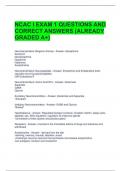NCAC I EXAM 1 QUESTIONS AND
CORRECT ANSWERS (ALREADY
GRADED A+)
Neurotransmitters: Biogenic Amines - Answer- Epinephrine
Serotonin
Norepinephrine
Dopamine
Histamine
Acetylcholine
Neurotransmitters: Neuropeptides - Answer- Endorphins and Enkephalins (both
naturally occurring opioid peptides
CRF/Substance P
Neurotransmitters: Amino Acid NTs - Answer- Glutamate
Aspartate
GABA
Glycine
Excitatory Neurotransmitters - Answer- Glutamate and Aspartate
"Activates"
Inhibitory Neurotransmitters - Answer- GABA and Glycine
"Brakes"
Hypothalamus - Answer- Regulates biologic functions: circadian rhythm, sleep cycle,
appetite, sex, ANS regulation, regulation of endocrine glands
*connected to limbic system and pituitary gland
Receptors - Answer- Involved in the immediate effects of drugs and tolerance and
withdrawal
Acetylcholine - Answer- -derived from the diet
-learning, memory, arousal, attention, mood
-cholinergic neurons=neurons that synthesize and release acetylcholine
-two subtypes: nicotinic and muscarinic
,GABA - Answer- -decrease neuron activity, memory, anxiety, and anathesia
-inhibitory neurotransmtiter
-2 receptor subtypes: GABA-A and GABA-B
-GABA-A: sedative/anxiety reducing effects of benzos, alcohol, and barbituates--> these
act on GABA-A receptors; medications for epilepsy also acts on GABA-A receptors
(hence why seizures are common with CNS depressant withdrawal!)
Glutamate - Answer- -increases neuron activity, learning, cognition, memory
-excitatory neurotransmitter
-derived from proteins in diet
-four receptor subtypes: NMDA (hallucinogens), AMPA, Kainate, and metabotropic
glutamate receptors
-learning and essential role in the hippocampus
Dopamine - Answer- -pleasure, reward, movement, attention, memory
-structurally related to norepinephrine
-produces inhibitory postsynaptic potentials
-2 major dopamine projections: mesolimbic pathway and nigrostriatal pathway
Mesolimbic pathway - Answer- VTA-->NA
Nigrostriatal pathway - Answer- substantia nigra-->striatum
Norepinephrine - Answer- -Sensory processing, movement, sleep, mood, memory,
anxiety
-Arousal and stress responses
-Stimulating effects of cocaine and amphetamine
Serotonin - Answer- -regulation of mood, arousal, impulsivity, aggression, appetite,
sexual desire, and anxiety
Peptides - Answer- -200 identified
-hormones
-endogenous opioids
-food intake, H2O balance, anxiety, pain, reproduction, pleasurable effects of food and
drugs
Frontal Cortex - Answer- -executive functioning, organizing, setting priorities,
strategizing, controlling impulses
-last part of the brain to fully develop
*addictions that start prior to 25 y/o greatly interfere with PFT development
Neurotransmitter - Answer- Chemical substance that is released synaptically from one
neuron that affects another in specific manner
, Tolerance - Answer- Receptor adapts to the presence of the substance thus higher
doses are needed to have an effect
Hippocampus - Answer- memory
Amygdala - Answer- emotional regulation
Hindbrain (Rhombencephalon) - Answer- Medulla, pons, cerebellum
Medulla - Answer- Vital roles to sustaining life: breathing, heart rate, blood flow, opioid
receptors (*reason opiates can cause respiratory depression)
Pons - Answer- relay station for signals being carried from cortex to cerebellum
Cerebellum - Answer- body movements and coordination
Midbrain (Mesencephalon) - Answer- 1. Ventral Tegmental Area (VTA): dopamine cell
bodies; dopamine projection to NA=mesolimbic dopamine system (most strongly
implicated in dependence)
2. Sustantia Nigra: dopamine projection to forebrain; involved in coordination and
execution of movements (degeneration of SN neurons leads to symptoms of
parkinsons)
Forebrain (Diencephalon and Telencephalon) - Answer- Diencephalon: hypothalamus
and thalamus
Telencephalon: most highly developed area of the brain; separated by the longitudinal
fissure
Thalamus - Answer- Relay station for sensory and motor information
Basal Ganglia - Answer- -motor behavior
-caudate, putamen (striatum)
-globus pallidus, amygdala
Pharmacokinetics - Answer- bodys effect on the drug
Pharmacodynamics - Answer- drugs effect on the body
Nucleus Accumbens - Answer- -motivation, learning, signaling motivational value of
stimuli
-drugs increase dopamine levels in NA- *important in drug reinforcement
4 factors of pharmacokinetics - Answer- 1. absorption
2. distribution
3. biotransformation
4. excretion




